Honey is one of nature’s best healing balms for irritated skin, and the dryness, redness, and itching skin that is caused by eczema can all be alleviated by an eczema honey.
Eczema honey combines high-quality sources of honey, like manuka honey, with other compounds and salves to soothe itching and reduce redness and scaling.
Our researchers have analyzed and ranked the ten best eczema honey on the market, plus looked into the best science on using honey to treat skin conditions like eczema.
Research
Rankings
1. Manuka People Organic Skin Cream
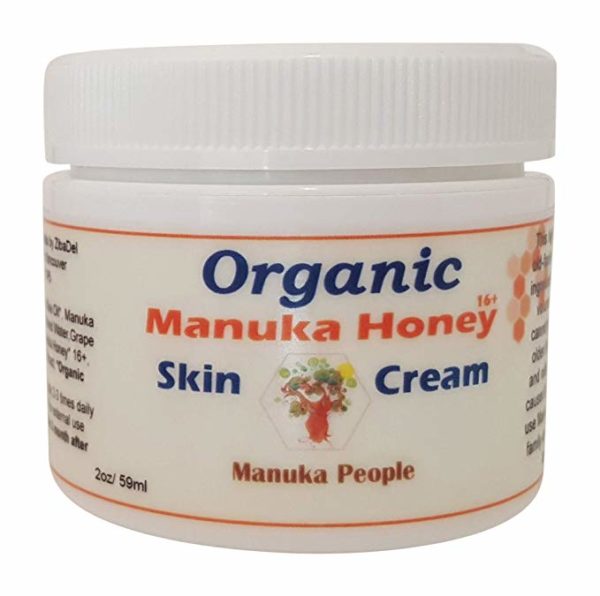
Manuka People Organic Skin Cream is a super simple eczema honey that has only a handful of ingredients. These include olive oil, manuka beeswax, manuka honey, and manuka oil extract.
One defining feature of this eczema honey is that the manuka honey used is certified according to one of the standard quality assurance protocols used to authenticate true manuka honey from New Zealand, so if you’re after high-quality ingredients, it’s a great choice.
Thanks to these advantages, it’s our number one pick.
2. Honeyskin Ultimate Face and Body Cream
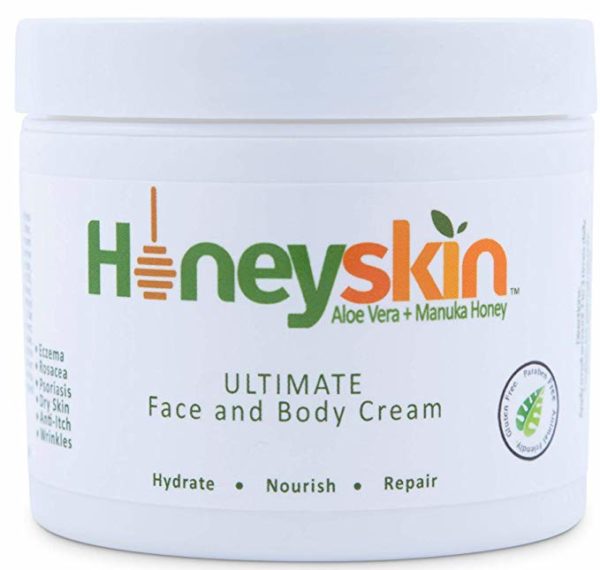
Honeyskin Ultimate Face and Body Cream is great for dry, itchy skin that’s heavily damaged and in need of repair.
It provides a wide range of vitamins and moisturizers to kick-start skin repair, along with aloe vera juice for better healing.
It also uses manuka honey, which has exceptional antioxidant and antibacterial properties, to fight all of the symptoms of eczema.
3. Wild Naturals Manuka Honey Cream
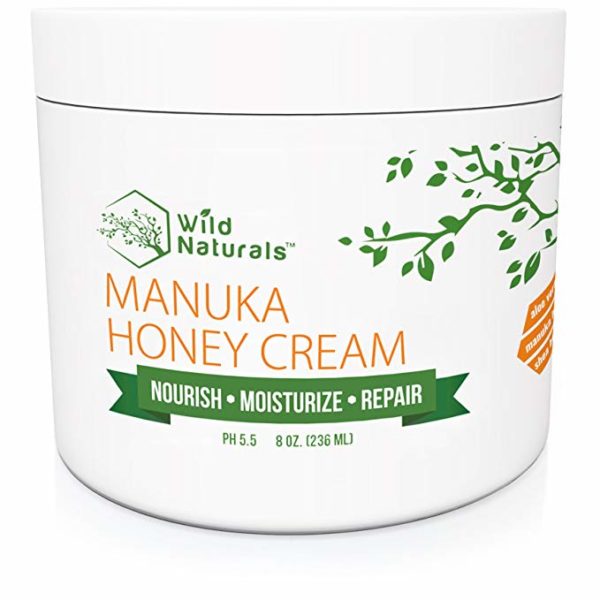
Wild Naturals Manuka Honey Cream is more of a “maximalist” skin cream than other eczema honey products, which is made obvious by looking at the ingredients.
It has several different moisturizers, plus manuka honey, in addition to a long list of plant extracts, vitamins, and stabilizers and preservatives.
It’s not the best product if you are looking for something all-natural, and people with sensitive skin may want to shy away from Wild Naturals as well, simply by virtue of the number of different ingredients which could sensitize skin.
The presence of retinol (vitamin A) could also cause skin issues for people with sensitive skin.
That aside, it does serve several purposes at once, so if you are looking for an all-in-one skin cream, it might be worth a shot.
4. Green Leaf Naturals Amazing Aloe Vera
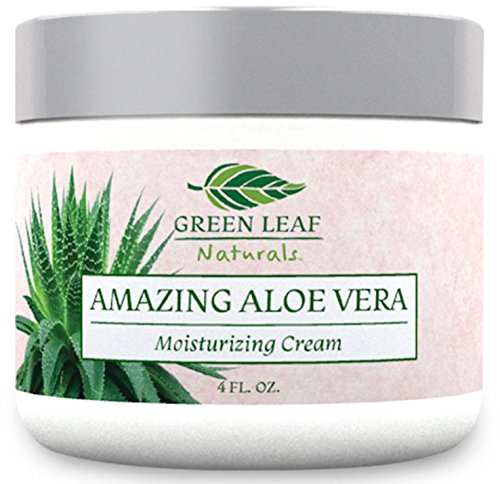
While Green Leaf Naturals Amazing Aloe Vera Eczema & Psoriasis Cream is based around aloe vera, but prominently features manuka honey as well.
It’s jam-packed with a variety of plant and seed oils to soothe and hydrate your skin, though the wide range of ingredients could pose problems for people with sensitive skin.
5. Elizabeth Parker Naturals Baby Eczema Cream
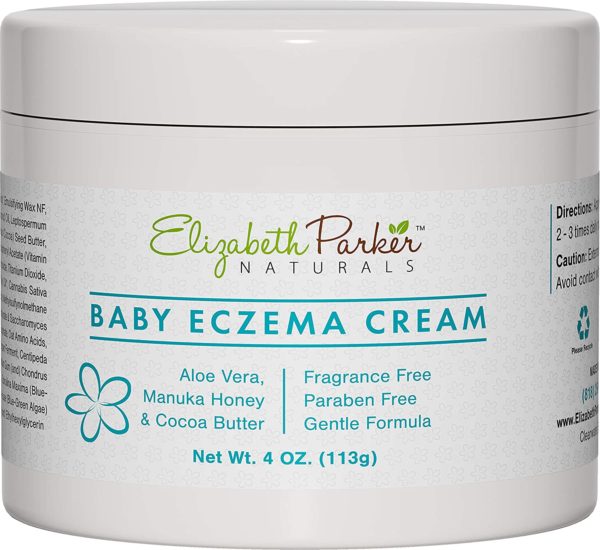
Elizabeth Parker Naturals has a nice balance between agents that heal and moisturize the skin and agents that provide nutrients for repair and another cream made for infants.
It prominently features manuka honey, alongside aloe vera juice and cocoa butter. The long list of ingredients means it might not be the best choice for those looking for a pure product but for all other, it’s a good choice.
6. Honeyskin Hair & Scalp Therapy
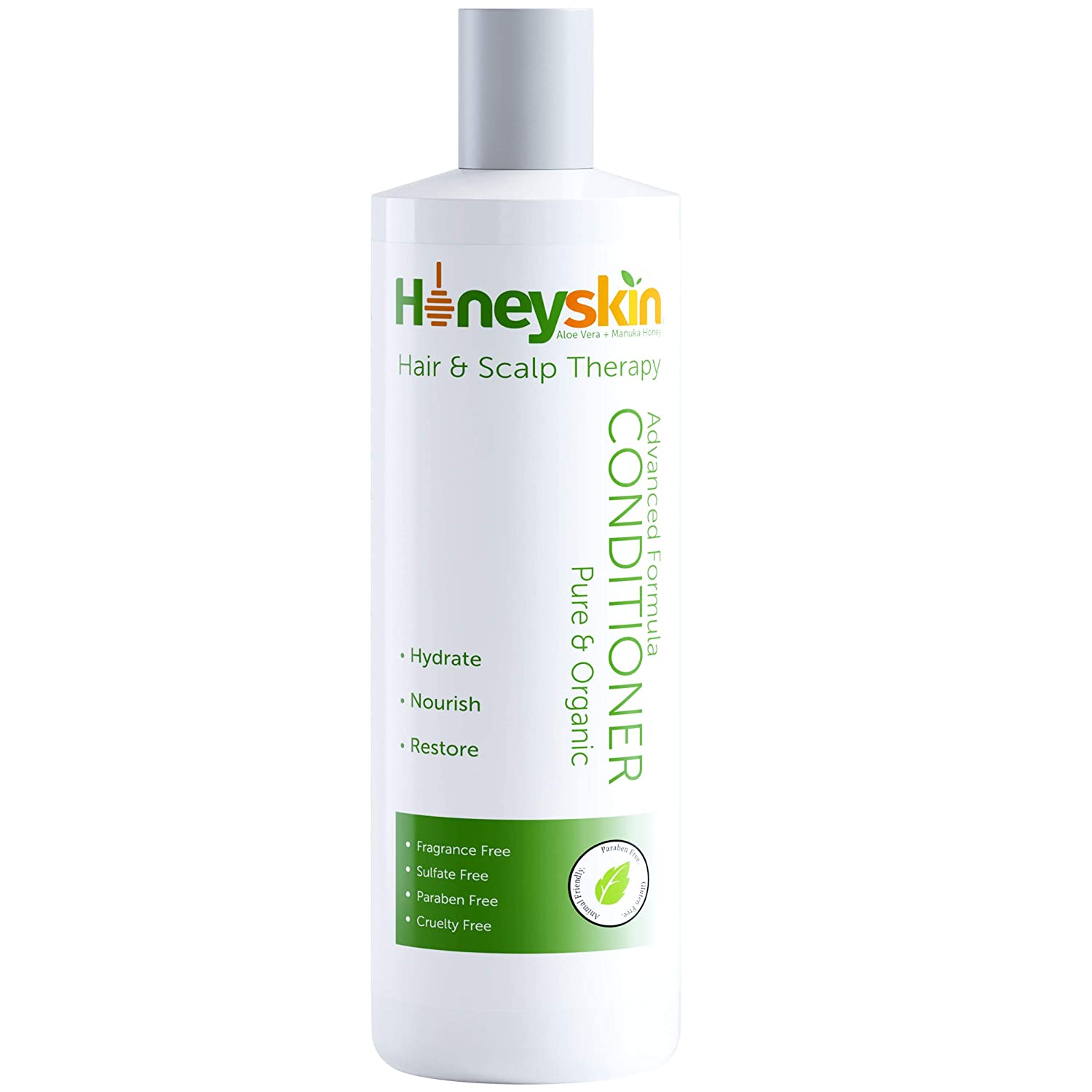
Honeyskin Hair & Scalp Therapy is specifically targeted for dryness, itching, and flaking on your scalp and in your hair. It uses the power of manuka honey and aloe vera to hydrate and nourish both hair and scalp, making it an excellent niche pick.
7. Advanced Clinicals Manuka Honey Cream
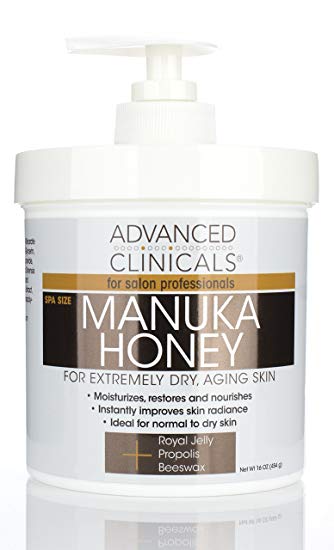
Advanced Clinicals Manuka Honey Cream prominently features manuka honey, but its activity as an ingredient is fairly low.
In terms of its constituents, Advanced Clinicals Manuka Honey Cream looks a lot like a standard moisturizer, with cetearyl alcohol, mineral oil, and aloe vera juice.
It does include honey and royal jelly, but the concentration of honey is likely too low to create a robust healing effect on its own.
8. Eras Natural Sciences’ Wound Honey
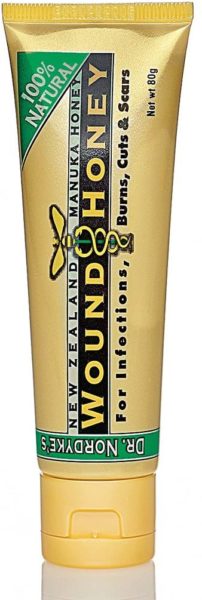
Sourced from New Zealand, Wound Honey contains 100% all natural manuka honey providing a safe and all-natural way to speed up external wounds, prevent scarring and protect against infection.
Eras Naturals Wound Honey also contains aloe and D-panthenol (a form of vitamin B) to further improve the effectiveness, smooth out your skin and decrease your overall healing time.
The downside to this product is that it is for spot treatment healing and not overall skin care. If you are looking for a body cream to alleviate wide spread eczema, this product may not be for you.
9. Puriya Mother of All Creams
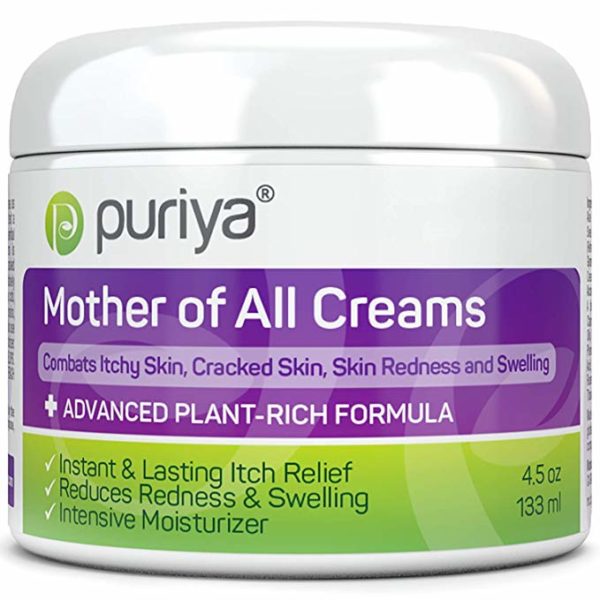
Puriya Mother of All Creams uses a combination of plant-derived and synthetic compounds to encourage moisture retention and speed skin healing.
Purists won’t like the inclusion of compounds like phenoxyethanol and caprylyl glycol, but there’s no denying that this cream has some serious healing potency.
Some of this is provided by honey, but unlike other competitors, Puriya Mother of All Creams does not use the particularly prized manuka honey from New Zealand.
Despite these drawbacks, it’s still a strong healing agent for redness, dryness, and irritation from eczema.
10. Balm of Gilead Manuka Honey Cream
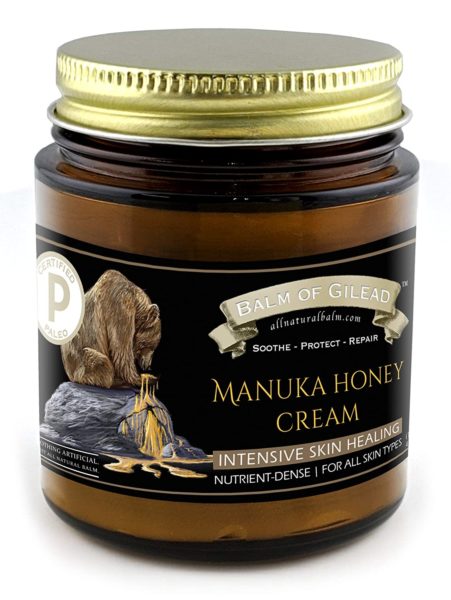
Balm of Gilead has created a cream with their proprietary blend of potent skin-nourishing ingredients including manuka, bergamot, tea tree and eucalyptus.
Full of vitamins A, C, D, E and K goes on non-greasy and is readily absorbed. This product is certified paleo however not all the ingredients are certified organic.
Category winners
Best eczema honey overall: Manuka People Organic Skin Cream
Manuka People is our overall top pick thanks to its very focused formulation and exceptional purity. It leans heavily on the benefits of manuka honey for treating skin, and augments these capabilities with manuka beeswax and manuka oil for hydrating dry skin. This synergy and simplicity makes it our top recommendation.
Best eczema honey for psoriasis: Honeyskin Ultimate Face & Body Cream
Honeyskin is perfect for psoriasis no matter where it occurs on your body. The combined action of aloe, cocoa, manuka, and shea are great for fighting the redness and itching that occurs with psoriasis.
Best eczema honey for sensitive skin: Manuka People Organic Skin Cream
Manuka People keeps things as simple as it can get with their eczema honey. With no extraneous ingredients to cause skin irritation, this is an excellent choice if your skin reacts poorly to many other creams.
Best eczema honey for scalp and hair: Honeyskin Hair & Scalp Therapy
Honeyskin applies its eczema honey expertise to the formulation of this conditioner to specifically target hair and scalp. The presence of both aloe vera and manuka honey act to fight itchy, flaky scalp and dry, frizzy hair at the same time.
Best eczema honey for babies: Elizabeth Parker Naturals Baby Eczema Cream
For diaper rash and other skin conditions that babies are prone to, Elizabeth Parker Naturals Baby Eczema Cream is a solid pick thanks to its prominent usage of manuka honey, aloe vera, and cocoa butter, all of which are great for soothing sensitive skin.
Best eczema honey for itchy skin: Wild Naturals Manuka Honey Cream
Itching, flaking, and dryness are the focus of Wild Naturals Manuka Honey Cream—by using a wide range of all-natural ingredients, it combines the healing properties of manuka with aloe vera, cocoa butter, coconut oil, and shea butter, to name just a few.
Who should buy eczema honey?
Eczema honey is great for individuals looking to improve their skin and combat skin diseases such as eczema. It can also help improve dry skin, psoriasis, and general inflammation.
Eczema honey, or any honey in general, should not be consumed by babies under the age of one. Pregnant women should be cautious about using eczema honey and speak to a medical professional before using it.
How we ranked
The first thing we looked at was the type of honey included and any supporting ingredients. Balm of Gilead Manuka Honey Cream provides a high-quality anti-inflammatory product to combat eczema, which is why it made our list. However, it ranked last since the actual concentration of honey was not clear. Era Organics made the list for providing an infant-safe honey product. Despite being effective and high-quality, it was also ranked lower for not including any honey.
Green leaf naturals found its way to the middle of our list for providing a potent eczema and psoriasis cream that contained proven ingredients such as honey and aloe vera. While it does provide a lot of useful ingredients, this can be an issue for people with sensitive skin – which is why it wasn’t ranked higher.
Of all the types of honey available, we preferred manuka honey for it’s wide range of benefits. Elizabeth Parker Naturals Baby Eczema Cream took 5th spot for providing powerful skin healing ingredients such as manuka honey, aloe vera, and cocoa butter. Again, its wide range of ingredients could cause issues in persons with sensitive skin. Honey Skin used concentrated manuka honey to provide one of the most potent formula’s on the market. It’s the best option for people wanting to exploit the power of manuka honey for treating skin issues.
Our top pick, Manuka People, contains organically certified manuka honey, olive oil, and beeswax to help manage and treat skin inflammations issues. This combination of ingredients helps to reduce inflammation while moisturizing the skin at the same time. Its minimalist formula eliminates a lot of skin sensitivity issues, making it one of the most useful products on the market for treating eczema.
Benefits
Eczema honey can help kill off bacteria that cause skin irritation and redness. Honey has long been used for its antimicrobial activities, stretching back to ancient times.
Though honey has been used to fight infection-causing agents for a long time, it has hasn’t been subject to scientific scrutiny until fairly recently.
Now, modern scientific research has started to uncover why honey is such a great antibacterial agent. A study published in 1998 by H.A.L. Wahdan in the journal Infection investigated the chemical compounds in honey responsible for its antimicrobial activity (1).
The author noted that honey contains substantial amounts of hydrogen peroxide, which is highly toxic to bacteria, but hydrogen peroxide is not the only antimicrobial compound in honey.
A number of flavonoids and phenolic acids in honey also contribute to its ability to fight against infectious agents.
Given that eczema can be substantially aggravated by bacteria, the antimicrobial activity of honey certainly contributes to the irritation-taming abilities of eczema honey.
Eczema honey can reduce inflammation in your skin. Honey contains a number of powerful antioxidants, which help fight inflammation and in turn, reduces eczema.
The antioxidant activity of honey was studied in detail in a 2008 study in the scientific journal Food and Chemical Toxicology by a team of researchers in Portugal (2).
The researchers screened a number of different types of honey for their antioxidant activity, and found that the strength of antioxidant activity depends on how dark the honey is.
As is the case with many other antioxidants, the darker the better: though clear honeys have some antioxidant activities, the deep amber-colored variants of honey tend to be the most active when it comes to fighting free radicals.
This may explain why manuka honey is a coveted ingredient in eczema honey: it’s known for being a particularly potent variant of honey, thanks to trace ingredients from the manuka tree that bees in New Zealand flock to when they make this particularly high-quality type of honey.
When blended with moisturizers, honey is particularly effective at reducing itching and dryness. In eczema honey products, you’ll often find honey combined with natural moisturizers like beeswax, olive oil, or shea butter oil.
The combined antimicrobial, antioxidant, and anti-inflammatory activities of honey dovetail well with agents that increase the moisture content of skin. This was demonstrated in a 2003 study in the journal Complementary Therapies in Medicine (3).
The study involved 39 patients with skin conditions who were randomized to either a standard treatment or a special compound made with honey, beeswax, and olive oil.
The results showed significant improvements in redness, scaling, skin thickening, and itching.
Though this was a small study, it indicates the promise of eczema honey for addressing many of the manifestations of eczema, all at once.
Side effects
Eczema honey products can vary widely in their ingredients, so side effects can sometimes be hard to predict.
The key ingredient—honey—is exceptionally well-tolerated; honey is not known to cause any adverse effects. What you need to watch out for are other ingredients that could cause skin aggravation or allergies.
Broadly, there are two categories of ingredients to watch out for. The first are plant and herb extracts. These are often helpful, but people with sensitive skin may have allergic reactions to some plant compounds.
As you might guess, the risk of an allergic reaction goes up with the number of different plant and herb ingredients. If you notice an increase in redness, irritation, and itchiness, or if you develop a rash, you might have an allergy to one of the plant ingredients in your eczema honey.
In this case, you should seek out a product with a more minimalistic design to have a better chance of eliminating the ingredient that is causing problems.
The second category of ingredients that could cause problems are synthetic compounds that cause drying or irritation, like alcohols and other “filler” chemicals.
If you are getting a high-quality eczema honey, this is not likely to be a concern.
FAQ
Why is honey so effective for treating eczema? Honey has been used for cosmetic and medicinal purposes for thousands of years. When it comes to treating eczema, honey contains powerful antioxidants and antimicrobial compounds that help soothe itchy, red, scaly, and irritated skin.
Research to date has focused on a particular kind of honey, manuka honey, that is native to New Zealand, because it seems to have particularly potent healing abilities.
Does eczema honey help to reduce scarring? Eczema honey may help reduce scarring by speeding up the skin’s healing process and reducing blemishes. Manuka honey is now being used by doctors in clinical trials because it’s been proven to be so effective.
What is the best honey to use in eczema honey? The best honey to use in eczema honey is manuka honey. Manuka honey is unpasteurized, meaning all its bacteria is still alive. This bacteria is what helps to treat wounds, skin inflammation and other issues. Raw organic honey is a great alternative if you can’t find or afford to use manuka honey.
Does eczema honey lighten the skin? Since honey is a known exfoliator, it may lighten dark spots on the skin. However, more research is needed to confirm this benefit.
What are the ingredients in eczema honey? Eczema honey is loaded with all-natural ingredients designed to soothe skin, promote healing, and reduce itchiness and discomfort. In addition to containing organic honey, most eczema honey products also contain cocoa butter, aloe vera, olive oil, oatmeal, tea tree oil, and various essential oils.
Is eczema honey sticky? Yes, eczema honey is sticky. However, it’s not as sticky as regular honey because it often contains a lot less honey than standard honey products.
What is the best treatment for eczema Topical corticosteroids, oral cyclosporine, and ultraviolet light therapy seem to be the most effective in treating eczema. However, there are lesser-known remedies that are supported by anecdotal evidence, including honey, oral antihistamines, and even primrose oil (4).
With eczema, what works for one person may not work for another. As such, it’s important to try a variety of treatments to find the one that fits best for you.
Which honey is good for eczema? Regular organic honey is known to help reduce inflammation and remove bacteria from the surface of the skin. It’s been used as a treatment method for wounds, skin conditions, and burns for several generations at this point.
Another type of honey that you might want to use topically for eczema is manuka honey. Not only does this type of honey provide the same benefits as regular honey, but it’s significantly more effective at reducing bacteria and inflammation. If you’re thinking about using manuka honey on your skin, keep in mind that the product is much more expensive than regular honey. The best affordable honey would be regular organic honey that does not include any preservatives or artificial additives.
How do you soothe an eczema flare-up? The most proven way to treat eczema flare-ups is by using medications that are prescribed by your doctor. However, if you’re looking to treat your eczema at home, there are plenty of household products that you can use to help soothe your flare-up. Some of these products are manuka honey, regular organic honey, oatmeal products, coconut oil, sunflower oil, aloe vera, and hydrocortisone cream.
Is eczema honey safe for babies? There are plenty of eczema honey products designed specifically for babies with eczema. These products are much more gentle on the skin and can help soothe your baby’s eczema flare-ups. However, it should be noted that babies less than 1-year-old should not consume any form of honey. The bacteria found in honey can be too much for a baby’s weak immune system to handle. It’s better to use less risky options when treating your baby’s eczema, with the ideal products being prescribed or recommended by a medical professional.
What is eczema? Eczema is commonly referred to as atopic dermatitis. Eczema causes your skin to become inflamed and itchy, which can be very painful. Typically, eczema is seen in younger populations, with it fading away by the age of 10. Thankfully, there are plenty of treatment methods available for eczema-related outbreaks, ranging from prescribed oral and topical medications to a variety of at-home remedies such as eczema honey (5).
Is honey good for eczema? Yes, honey is good for eczema and has been linked to improving several skin disorders and infections (6). For thousands of years, humans have been using honey on their skin because of its anti-inflammatory and antibacterial effects.
Is eczema honey sold in stores? Though you might be able to find eczema treatment products that contain honey while you’re at a retail store, these are often not true eczema honey products. Real eczema honey products developed by Eczema Honey Co are sold strictly online.
On their website, you can find several varieties of eczema creams for adults and babies, travel bundles, scalp oils, lip balms, gloves, sprays, soaps, and even bath bombs. Each product contains honey and other natural ingredients included to reduce eczema flare-ups and soothe the skin.
Is eczema honey safe? Eczema honey products are considered safe because they’re made of all-natural ingredients. They also do not contain any preservatives or artificial additives that are known to irritate the skin.
The only concern with eczema honey is using them on babies. Babies under the age of one should not consume honey due to the high levels of bacteria – which can cause botulism. Though it can be easily fought off in adults, the immune system of babies is still developing, and botulism can cause serious developmental issues, paralysis, breathing issues, or death.
How do you apply eczema honey? To use eczema honey properly, simply apply the eczema honey directly to the affected skin and rub it in gently.
Some products are similar to a lotion and can remain on the skin until it fully soaks in, but others will need to be washed off after a little bit.
What is eczema honey? Eczema honey is a range of eczema-related products that are made with organic honey. It includes a wide range of natural ingredients like essential oils and soothing ingredients, designed to relieve the symptoms of eczema, specifically flare-ups. Eczema Honey Co sells plenty of eczema honey products that range from lotions to bath products to gloves.
Can regular honey help treat eczema? Any honey product can be effective in treating eczema. Honey products, both regular organic honey and manuka honey, are known to reduce inflammation in the skin and remove bacteria from the skin’s surface.
Does eczema honey expire? Regular honey products typically do not expire if they’re stored properly. Eczema honey products, on the other hand, have a shelf-life of 1-2 years. The actual expiration date will depend on the specific product you buy and the ingredients used to develop the product. If you live in a humid environment, you might want to refrigerate your eczema honey products in order to prevent melting.
Does eczema honey really work? With antibacterial and anti-inflammatory qualities, honey is a very good tool for treating eczema. Eczema honey contains real honey, making it extremely effective for managing various skin conditions. Just how well eczema honey products work depends on the severity of your condition and how much actual honey is included. If you’re using eczema honey products and they aren’t producing the effects you’re looking for, you might want to switch to a 100% honey formula or speak to your doctor for recommendations or prescriptions.
Does eczema honey have to be refrigerated? Eczema honey does not have to be refrigerated, just like regular honey. If you store your honey in a cool and dry location that does not have direct access to sunlight, there should be no concern about a loss of quality in the product. However, if you live in a hot environment, refrigerating your eczema honey might be a good idea to extend its shelf life. The best way to guarantee that your eczema honey retains its quality and longevity is to store it properly and make sure it’s tightly sealed when you’re not using it.
Does eczema honey work on psoriasis? While eczema honey is specifically targeting consumers that have eczema, many eczema treatments can also be used for conditions like psoriasis. This is because honey, in general, can help reduce inflammation of the skin as well as remove bacteria and foreign bodies from the skin’s surface.
Eczema honey, honey, and manuka honey can all prove to be effective in treating psoriasis as well as eczema.
Can you eat eczema honey? While you can eat it, you probably shouldn’t since eczema honey products are not like regular honey. In addition to honey, they also include a variety of oils, creams, and solutions that are known to soothe the skin and reduce inflammation. These ingredients, while all-natural, are not necessarily safe to consume orally.
Can eczema honey work for acne? Honey helps to balance the bacteria in the skin, which can be beneficial for treating and controlling acne. Its anti-inflammatory properties also help to come down acne outbreaks and skin inflammation.
Can eczema honey help heal wounds? Yes, honey can help treat wounds by providing encasing a wound in a protective layer, thats filled with anti-bacterial and anti-inflammatory benefits. A 1993 study showed that manuka honey can decrease wound sizes by up to 88% when applied topically (7).
Another 2017 study set out to determine if manuka honey could help tissue regeneration. Researchers found that in addition to bacterial growth inhibition, manuka honey can enhance wound healing and tissue regeneration. The non-peroxide bacteriostatic properties of manuka honey are associated with the presence of methylglyoxal (MGO) (8).
Can eczema honey help treat burns? Eczema honey is well known to have anti-oxidant, anti-bacterial and anti-inflammatory properties that help treat skin disease and acute wounds such as superficial partial thickness burns. Studies show that honey leads to improved pain relief in burn patients due to honey’s high acidity, anti-bacterial action and high hydrogen peroxide and anti-oxidant content (9).
Related Articles
Recap
Eczema honey combines the multitude of benefits of honey with ancillary benefits offered by moisturizers and healing agents to address all of the symptoms of eczema.
The antimicrobial, antioxidant, and anti-inflammatory action of honey helps reduce redness, inflammation, and irritation.
These properties are particularly effective in darker types of honey, like manuka honey, so look for these ingredients when shopping for an eczema cream.
When the benefits of honey are combined with moisturizing and healing agents like olive oil, beeswax, shea butter, and aloe vera, eczema honey can help reduce scaling, thickness, and itching in your skin as well.
While the primary ingredient in eczema honey is not associated with any adverse effects, people with sensitive skin might react poorly to eczema honey products with lots of different herbal and plant extracts if these ingredients provoke an allergic reaction.
Synthetic fillers can cause skin irritation too, but this is not typically a problem in a high-quality eczema honey.
If you are looking for an additional skin product to help reduce the symptoms of eczema, you may want to give eczema honey a try. It’s an all-natural way to address the redness, itching, scaling, and inflammation associated with eczema.
For BodyNutrition‘s #1 eczema honey recommendation, click here.